FreeAgent review: Financial software you can count on
A hugely feature-packed small business cloud accounting suite, based in the UK
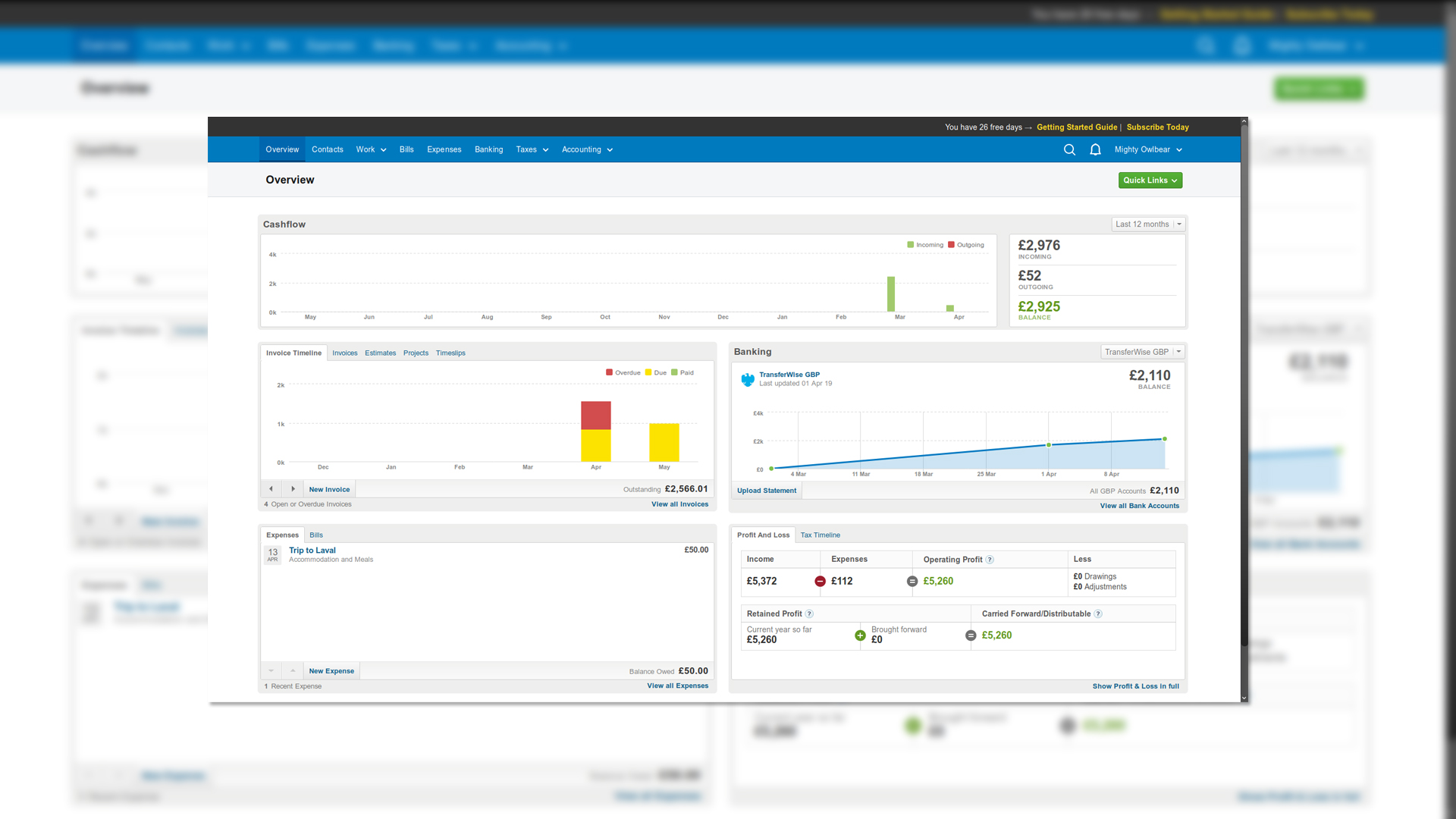
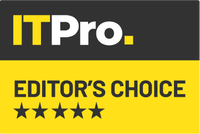
With full support for digital tax filing with HMRC and feature tiers that are based solely on the legal requirements for British businesses, FreeAgent isn't the cheapest service around - but it's an ideal accounting tool for UK-based small businesses.
-
+
Feature tiers based on UK business classifications; UK-based, with UK data centres
-
-
More expensive than some rivals

One of the few cloud-based accounting suites based in the UK, with data centres located in England, FreeAgent focuses on providing services to small limited companies, partnerships and sole traders. It's fully equipped to handle both HMRC's new Making Tax Digital platform for VAT payments, as well as PAYE, pension auto-enrolment and national insurance payments.
Charities can select the Universal version of FreeAgent, but those with paid staff should note that this doesn't include an HMRC-compliant payroll feature or UK VAT filing.
FreeAgent offers a variety of different pricing tiers. For most of the world, it only shows a single tier, priced at $20 (15.29) per month and covering any company structure you select. For UK users, however, pricing is more granular, a little more expensive, and includes specialist tools and tax filing features appropriate to your company structure.
Sole traders pay 19 per month (exc VAT) and get self-assessment features. Partnerships are charged 24 per month (exc VAT) and get profit share calculation features but partners currently have no self-assessment capabilities. Limited companies are charged 29 per month (exc VAT) and get access to self-assessment filing for directors, dividend vouchers and corporation tax forecasting.
New users get six months at half price and discounts are available if you pay annually, rather than on a rolling monthly subscription.
All tiers include Making Tax Digital-compliant VAT filing, multi-currency invoicing and unlimited users, clients and projects, and all FreeAgent users also get a gigabyte of file storage - with a maximum file size of 5MB - to help keep track of important documents and records.
FreeAgent review: Setup and configuration
After signing up, you're prompted to confirm your business type. It's important to get this right as it can't be changed later, and key features offered and calculations made by FreeAgent depend on this selection. The options for UK businesses are Sole Trader, Partnership, Limited Liability Company and Limited Company. Sole Traders and Partnerships can draw dividends, Limited Companies and LLCs get payroll and pension features, and all of them can file VAT if appropriately registered.
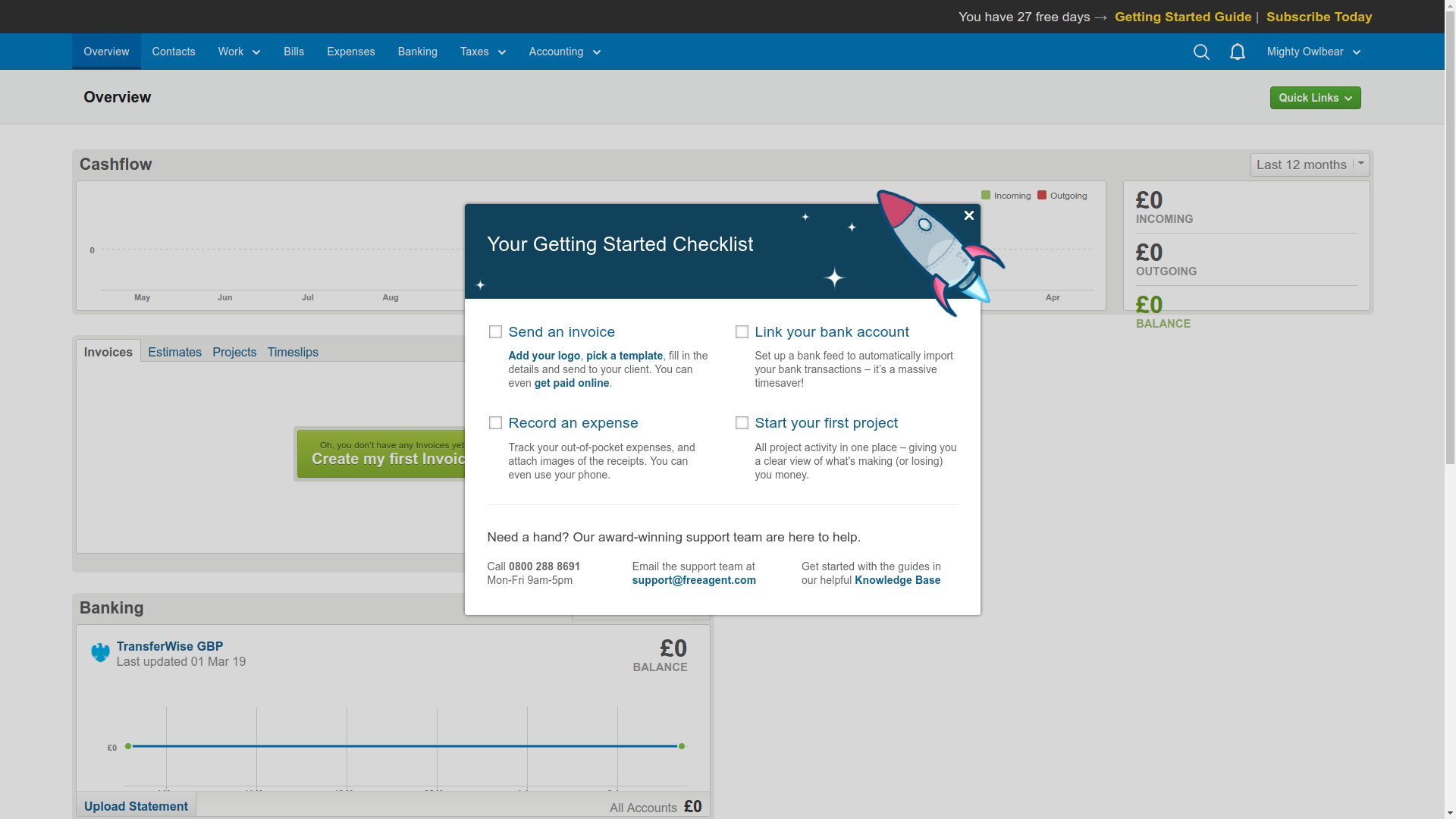
As well as a start date and tax year date for your business, you're prompted to include details of the bank account you use for your business from the very beginning. All you have to do here is give the account a name, enter the bank's name, your account number and sort code and your opening balance as of your FreeAgent start date. Later, you'll be able to set up direct feeds for supported banks.
With that done, you're presented with a checklist to help you customise and get familiar with FreeAgent. The guide takes you through customising and sending invoices, recording expenses, linking bank accounts so that transaction data is automatically imported, and using FreeAgent's projects feature. Items are ticked off as you work through the list.
FreeAgent review: Clients and Invoicing
If, as suggested, you jump straight into creating your first invoice, you'll be prompted to enter the name of your client and an invoice reference number, which by default will become the starting point for a sequential numbering system used by all invoices, although you can also have individual number sequences for specific clients and projects.
You'll specify the date, payment terms in days, currency and any additional text you wish to add to the bottom of the invoice. You can also set a default text to appear on all invoices. Further options allow you to add discounts, select the applicable VAT region, customise payment terms and contact information for specific invoices and customers, display project names, company logos and banking details as required.
Invoices can be emailed out, but you'll first have to confirm your email address and create a template email. FreeAgent has a surprisingly powerful set of macro commands that you can use to insert invoice data into your email. The same template creation tool can be used to email estimates to clients, as well as automatic reminders for imminent, due or overdue invoices and thank you notes when they're marked as paid.
With that done, you're taken to the invoice itself where you can itemise what you're charging for as products, services, blocks of time, projects and more. From here, links allow you to further customise your invoice and contact information, change the invoice's theme, save the invoice as a PDF for printing, send it by email, or use it to create a recurring invoice to make it easy to bill for subscriptions and rolling contracts. You can also configure online payment handling via PayPal, Stripe and GoCardless.
The only thing you'll need to create a contact is a name for the client and an email address if you plan on invoicing them electronically. However, it's a good idea to populate your contact book with as much data as you need for your clients and suppliers on a day-to-day basis.
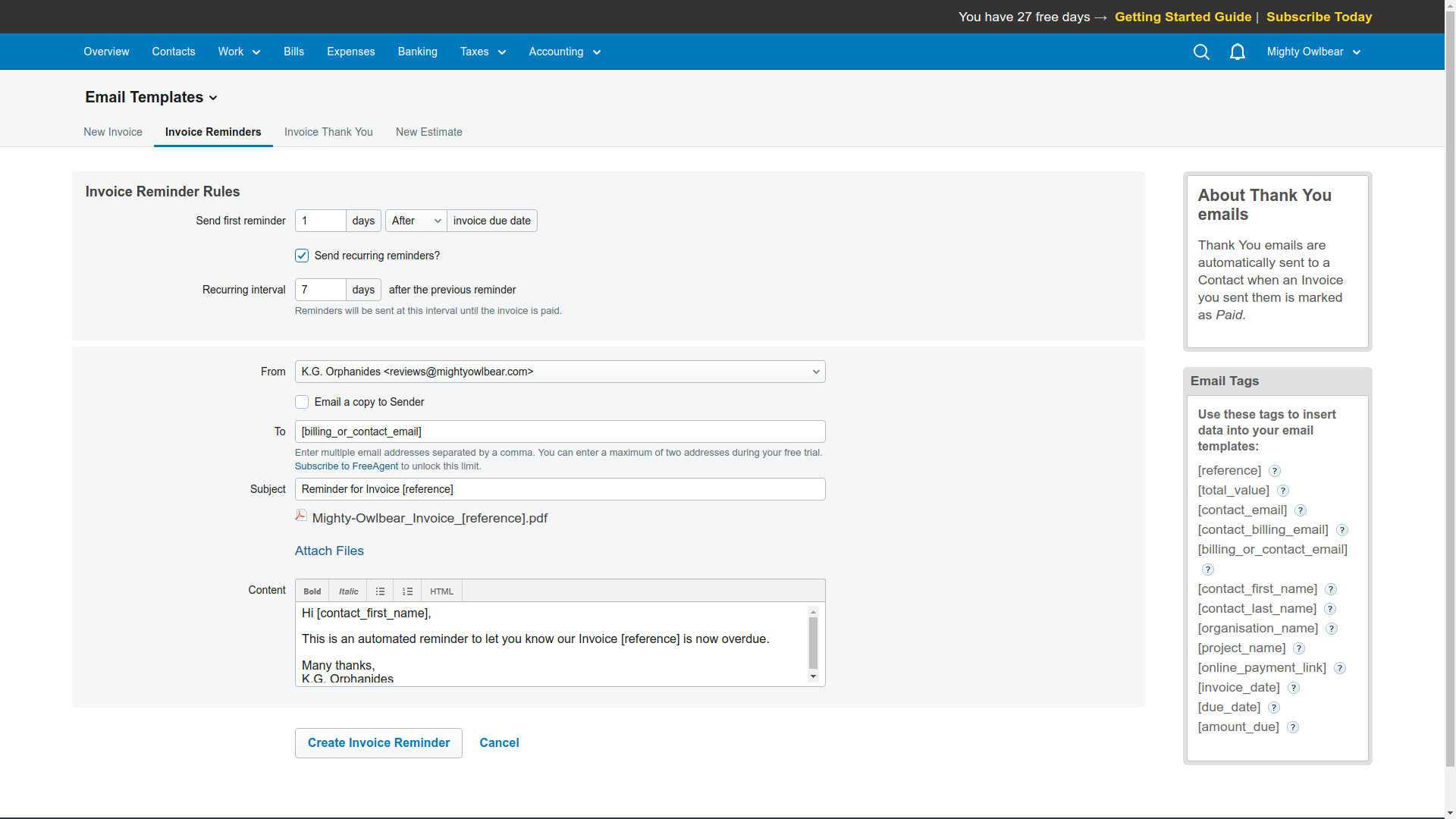
FreeAgent's Contacts screen allows you to manually add full details and per-contact invoicing preferences or import contacts from a wide range of other sources, including Gmail or G-Suite, Outlook, your Apple contacts book and rival accounting service FreshBooks.
Invoices and estimates, alongside other key billing and tracking tools, can be found beneath the Work tab at the top of FreeAgent's reassuringly consistent interface, and are among the data summarised on the main overview screen.
FreeAgent review: Bills, expenses and payroll
FreeAgent provides businesses of all sizes with tools for logging expenses, bills and other payments. How that appears will depend on the kind of businesses you've set up.
Sole traders just have a single Expenses tab, where they can register payments made on a personal card on behalf of the business or log road vehicle mileage to reclaim VAT on fuel costs. You can attach receipt images, add descriptions, make the expense recurring and link it to a project.
Larger firms instead get a tab labelled My Money, with pull-down options for Expenses, Dividends, Salary and Payroll. A lot of careful design has been invested to help people who run small limited companies keep clear boundaries between the business's money and their own.
The Bills tab appears for all kinds of businesses, and covers anything that you get an invoice for but don't have to pay immediately, allowing you to keep track of exactly when you'll have to pay them. For items that are paid immediately or via recurring direct debit, FreeAgent instead recommends simply assigning outgoings to appropriate categories as they appear in your bank statements.
FreeAgent review: Banks and accounting
FreeAgent can link to your bank accounts to automatically import your transaction history. The usual range of UK high street and business banks is supported via Yodlee, as are major international banks.

Once connected, all transactions will be imported so you can easily reconcile them against invoices and assign outgoings to appropriate categories on your chart of accounts.
However, almost none of the most recent online-only challenger banks are represented. Although there's a dedicated integration to add support for Revolut accounts, we had no luck searching for Shine, Monzo or TransferWise. Fortunately for businesses that use such banks, or those who'd rather not use online linking tools, you can click past the initial "link your account" screen shown in the Banking tab and simply upload bank statements.
Statement uploads in OFX, QBO and QIF formats are fully supported, as are a few banks' CSV files. For others, you'll have to manually reformat the files, removing all column header rows and all columns apart from date, transaction and description. While we'd have liked to see integrated column selection, it's still a big step up from accounting suites that only support direct bank linking.
You can create as many accounts as you need, in whatever currencies you use, with separate account types for standard bank accounts, PayPal accounts and credit cards.
FreeAgent can also be instructed to try to automatically assign transactions to the most relevant category in your Chart of Accounts if you enable the "guess bank transactions" feature, which learns and improves its accuracy based on transactions you manually categorise.
Account reconciliation is a smooth process with pull-down menu options and COA categories for most transaction types you're likely to encounter, from sales and refunds to inter-account transfers. Some, however, you'll have to first create a COA category for - we had to do this when entering income from royalty payments.
You can add new categories, via the Accounting, Tax & VAT section of FreeAgent's settings, and can view the status of all active COA categories, along with numerous other reports, under the Accounting tab in FreeAgent's main navigation bar.
Because it's designed to suit any business, FreeAgent is absolutely jam-packed with features. There's basic stock control that lets you keep track of sales, purchases and quantities of items for sales-based companies and project management with time tracking that allows you to bill at pre-agreed hourly rates, with optional time and currency budgets.
FreeAgent review: Tax and payroll
The tax and payroll options available to you with FreeAgent depend entirely on the kind of business you run. Everyone who's VAT-registered gets access to UK VAT filing via HMRC's new Making Tax Digital portal - after you've connected FreeAgent to your MTD portal account and set up your VAT return periods, you can submit your filings with just a couple of clicks. An on-screen guide helps you through the initial connection process.
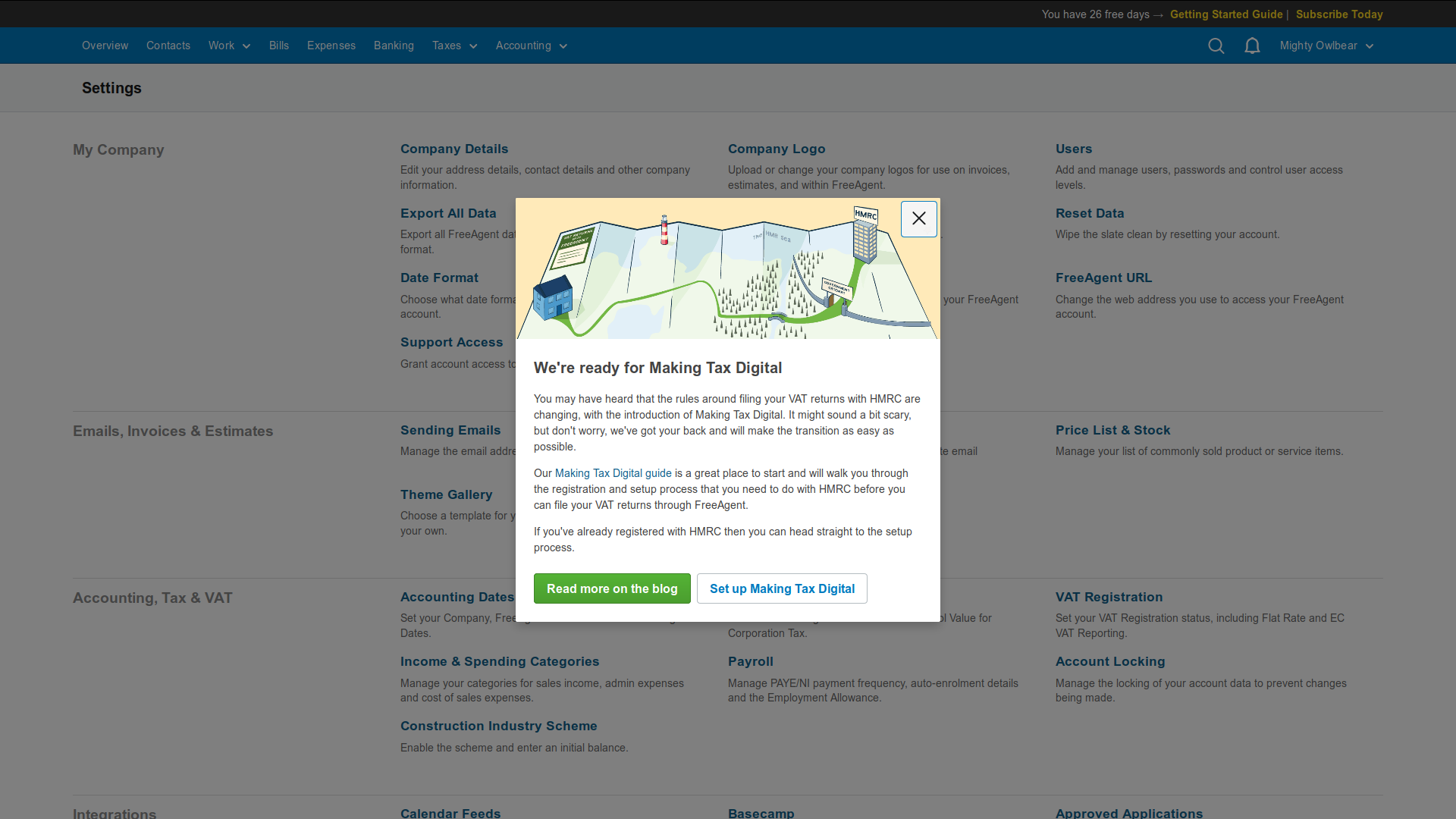
If you make relevant digital sales to European customers, you can also tag items that fall under the EU's VAT MOSS scheme to make it easier to tot up figures for European VAT filings.
Sole traders and company directors get an excellent self-assessment interface for their tax returns and larger businesses get an integrated payroll module that, once configured, automatically submits to HMRC, with support for student loans, parental leave and employment allowance. FreeAgent also supports the Construction Industry Scheme for subcontractors.
FreeAgent review: Apps and integrations
A range of integrations for third-party services are available, split between the settings page and a dedicated add-ons shop. There's support for a range of online payment systems, project management tools like Basecamp, plus CRMs such as Capsule and receipt processing services including Receipt Bank and Rydoo.
The obligatory mobile app has support for the invoicing, time tracking, client logging and expense tracking on the move. It also gives you a wide range of account management and reporting features, including an overview of your tax filings and bank transaction reconciliation.
FreeAgent review: Verdict
We love the clarity of FreeAgent's UK tier structure. While many rival's cheaper tiers restrict the number of invoices or active clients you can have, or can't combine MTD with self-assessment, FreeAgent gives you everything your businesses can legally take advantage of, with no other restrictions.
It's a little more expensive than rivals such as FreshBooks and QuickBooks but for VAT-registered small businesses, the features FreeAgent provides mean that you'll never outgrow your accounting software and you won't have to pay for extra bolt-ons.
Its interface and documentation are also excellent and we were very pleased to find that FreeAgent, almost uniquely, uses UK data centres. For UK businesses, that all adds up to a package that wins over bigger names like Sage and Xero.
Verdict
With full support for digital tax filing with HMRC and feature tiers that are based solely on the legal requirements for British businesses, FreeAgent isn't the cheapest service around - but it's an ideal accounting tool for UK-based small businesses.
Get the ITPro daily newsletter
Sign up today and you will receive a free copy of our Future Focus 2025 report - the leading guidance on AI, cybersecurity and other IT challenges as per 700+ senior executives
K.G. is a journalist, technical writer, developer and software preservationist. Alongside the accumulated experience of over 20 years spent working with Linux and other free/libre/open source software, their areas of special interest include IT security, anti-malware and antivirus, VPNs, identity and password management, SaaS infrastructure and its alternatives.
You can get in touch with K.G. via email at reviews@kgorphanides.com.
-
 Nvidia braces for a $5.5 billion hit as tariffs reach the semiconductor industry
Nvidia braces for a $5.5 billion hit as tariffs reach the semiconductor industryNews The chipmaker says its H20 chips need a special license as its share price plummets
By Bobby Hellard Published
-
 Business leaders are having a crisis of confidence over data literacy
Business leaders are having a crisis of confidence over data literacyNews A Salesforce survey reveals business leaders don't trust their data, or their ability to make the most of it
By Emma Woollacott Published
-
 MITRE CVE program handed last minute reprieve amid funding lapse concerns
MITRE CVE program handed last minute reprieve amid funding lapse concernsNews The MITRE Corporation's Common Vulnerabilities and Exposures (CVEs) database has been handed a last minute reprieve amid concerns over funding.
By Rory Bathgate Last updated